Welcome to Close Reads! In this series, Leah Schnelbach and guest authors will dig into the tiny, weird moments of pop culture—from books to theme songs to viral internet hits—that have burrowed into our minds, found rent-stabilized apartments, started community gardens, and refused to be forced out by corporate interests. This time out, the incomparable Emmet Asher-Perrin meditates upon an important moment in The One with the Whales.
Up until more recent iterations, the state of art was something of a puzzlement in Star Trek. Here we are in a big, bold future where humanity has cast aside differences and works together toward mutual enlightenment, but film and television seem to have vanished from the collective consciousness—and the literature canon enjoyed by most Starfleet officers largely consists of Shakespeare, Doyle, Dickens, and the occasional smoky holodeck noir.
Which is why, in actuality, the greatest moment in Star Trek history occurs in 1986, on a bus in San Francisco.
Before I get into that, I will acknowledge that there are exceptions to this rule, of course. (See: Doctor Bashir’s James Bondian knock-off holosuite program.) But that doesn’t change the fact that Star Trek largely avoids the appearance that their characters could appreciate anything falling under the moniker of “vulgar” or “trashy.” Their approved canon is built predominantly of works that would be welcome in any Western high school English class syllabus. It’s fun at times, but not particularly inspired, and certainly not as broad-minded, encompassing, and cultured as Trek often proclaims itself to be.
There are certain real-life considerations behind that, which are more than fair; if you start acknowledging pop culture too much in your pop culture television series, you run the risk of crossing wires—or even worse, pointing out the places where your own plots and conceits fall flat. No one wants a character to have enough fictional awareness to avoid problems or suggest solutions by citing their favorite film because then you’re constantly bogging down your stories with too much meta-awareness… especially when you exist on television and episodic arcs are your toasted bread and fresh creamery butter. Even more so when you live in a super special future where everyone is purportedly smart enough to come up with these ideas on their own. (Well, smart enough and also housed enough and fed enough and educated enough and healthcared enough and work-life-balanced enough and curious enough and gosh darn, this future sounds great, when do I get one?)
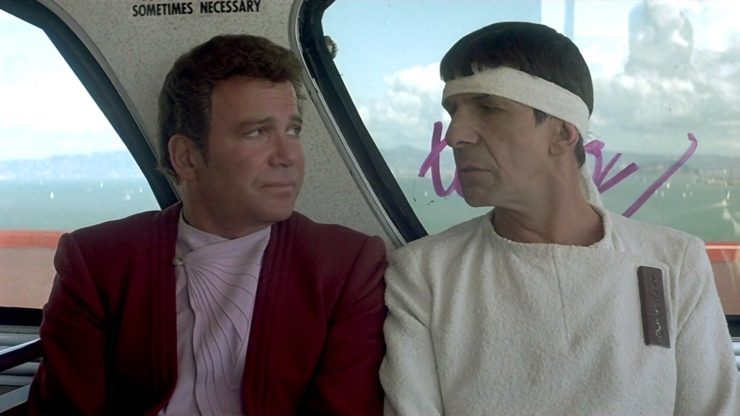
This has the unfortunate side effect of suggesting that not only does everyone in the future largely subscribe to a completely Westernized canon, but also that no one enjoys (never mind appreciates) anything a little less intellectually rigorous. And that’s already a strange leaping off point because, as any good historian or theatre scholar will tell you, Shakespeare was not considered highbrow entertainment when it was first staged—it was also pop culture, designed to appease the masses just as much as the reigning monarch. So were Dickens and Doyle. So the point really becomes that, for whatever reason, people several hundred years in the future are only enamored with relatively ancient pop culture, and nothing that even approaches their own era. It’s so gauche, don’t you see.
I’m not saying that all 20th century art maybe somehow got erased due to World War III, but I’m kind of saying that?
The real point is that this would be equivalent to folks in the 21st century walking around quoting The Decameron to our friends, on our way the cineplex to watch yet another adaptation of Dante’s Inferno, and remembering that when we get home, we’ve got yet another reboot of The Canterbury Tales to stream on TV. It’s that wide of a remove, and treated as totally commonplace within their universe.
This is why it is some flavor of miraculous to watch Star Trek IV: The Voyage Home, and see the Enterprise crew amongst such banal 20th century surroundings. They’d pulled missions like this before, of course (thanks to Gary Seven and the Guardian of Forever and that one Air Force dude in 1969), but never with such a level of immersion and movement available to them and to the audience. Never with the chance to get aboard public transportation in the Bay Area and encounter a mohawked punk with a boombox—who gladly flips them off when Kirk requests that he turn his music down.
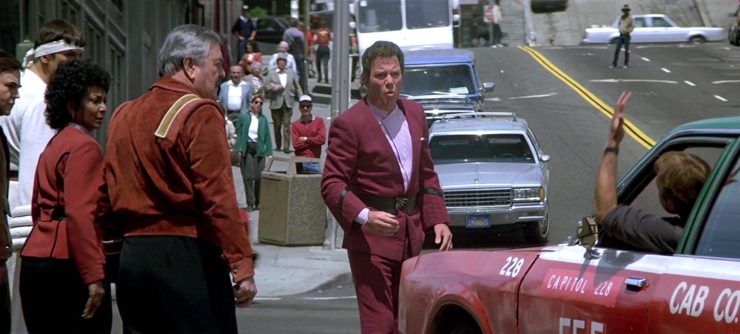
This is also after the admiral almost gets hit by a car crossing the street (which you’d think he would know to look out for considering how Edith Keeler died), only to be surprised when the driver leans out his window and suggests that he “Watch where you’re going, you dumbass!” Kirk is understandably surprised—his Chief Medical Officer regularly calls his half-Vulcan Science Officer a “pointed-eared hobgoblin,” but this is surely beyond pale for mere strangers. They haven’t even been introduced.
So he gamely shoots back with a “Well, double dumbass on you!” and continues on his elevated, world-saving way.
The fact that cursing seems to be the rule of the day proves a minor fascination to Spock, however, who takes the time to bring the subject up with his admiral after nerve-pinching the bus punk into a pleasant slumber. (The guy probably misses his stop as a result, so hopefully he doesn’t have any world-saving plans that day.) In pointing out the sharp increase in “colorful metaphors,” as he terms them, Spock gives Kirk the opportunity to explain that it’s common in this particular era of human history to use swear words more frequently as emphasis and embellishment. (Again, I’m going to skip over the fact that, just as Shakespeare used to be considered lowbrow entertainment by many, humans have always cursed freely in the service of expression. Check the walls of Pompeii.) When he adds that it was particularly common for the literature of the period, Spock asks for examples.
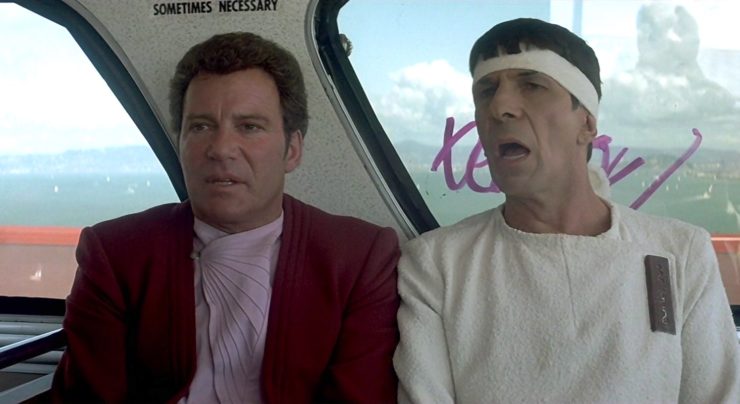
“Oh, the complete works of Jacqueline Susann,” says Kirk thoughtfully, “the novels of Harold Robbins…”
“Ah…” Spock replies in immediate recognition. “The Giants.”
Someone do a record scratch! Or just, you know, imagine you heard one.
Look, Jim Kirk is a canonical bookworm and Spock is generally learned in a wide variety of subjects, so it’s not completely shocking that one of them has read The Carpetbaggers. I can buy that. It seems plausible. As far as I’m concerned, Kirk is a secret romance novel buff (he’s a sap who makes eyes at all his favorite people constantly), and Spock probably has a very intelligent system where he reads two or three sample books per decade of human history (in the periods where humans produced something approaching literature), for better historical understanding. He is half-human, after all, and his mother was probably proud of the effort, even if the Vulcans turned their collective noses up at his after-school hobbies.
But Spock calling Susann and Robbins “the Giants,” is another matter entirely. It suggests that these works are respected in the future—when both authors were often and roundly ridiculed by the literary establishment during their careers, despite being some of the best selling writers of the era. It suggests that both Kirk and Spock are well aware of their tawdry oeuvres with all the cursing, sex, and drug-use contained therein.
It suggests that Spock has read Valley of the Dolls. And he liked it.
I care about that so much more than the fact that he can cite Hamlet act by scene. I care about it so much more than his ability to play the Vulcan harp. Spock knows there are no guilty pleasures, only things that you enjoy, and now I need his reading list—not the Federation approved one that probably goes in all his future biographies, but the one he shared with Uhura during jam sessions in the Enterprise rec room. Is Bridget Jones’s Diary on it? Delta of Venus? Outlander? Does he have opinions about Twilight?
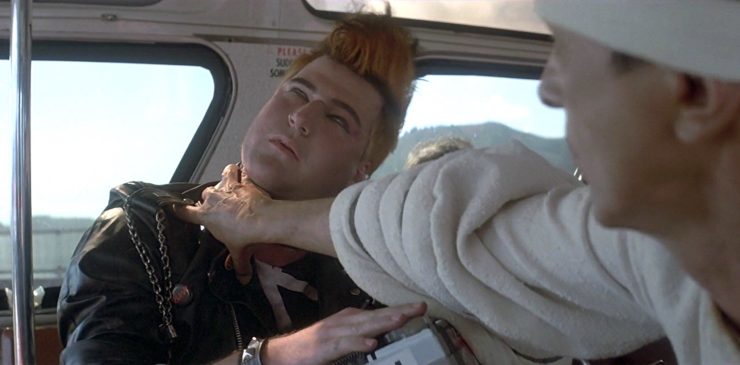
But there’s another angle to this that gets me a little teary, being that Susann and Robbins are both Jewish authors. So having Leonard Nimoy, himself a Jewish actor, commenting on the legacies of these two, calling them “giants” in their field… that hits a little different on a contextual level. It doesn’t matter whether it was intentional in the script or not—and it certainly might have been—the point of connection is there. The moment of recognition between generations of Jewish artists sits in the midst of this eclectic romp of a film, staring you in the face, blinking emphatically.
It’s hard for me not to feel a bit emotional over that.
And it goes one further, because I can’t help but suspect that Nimoy might have felt an affinity toward both of these authors. Difference of content not withstanding, he occupies a similar space in the cultural zeitgeist: an actor in a pop culture juggernaut that, for many years, was not taken at all seriously by arbiters of culture and class. When all of this started, Star Trek was a weird space show, beloved by oddballs. It was unclear what its impact would be before a late-century renaissance guaranteed its longevity.
There was a period where this uncertainty caused Nimoy visible distress, as a man who was quite thoughtful and serious about the art he put into the world. (He was a writer and a photographer, too, mind you.) But he seemed to make peace with his position in later years, to recognize its value. He is a member of a rarefied sphere of artists who managed to shape our future with work that many might have once called pedestrian. You know, the trashy, vulgar stuff that people shouldn’t put in their syllabi.
Ah, yes… the Giants.
Emmet Asher-Perrin always needs to mention that Star Trek IV was the very first film they ever saw in the movie theater, as an infant, and apparently they cheered the freeing of the whales. You can bug them on Twitter, and read more of their work here and elsewhere.










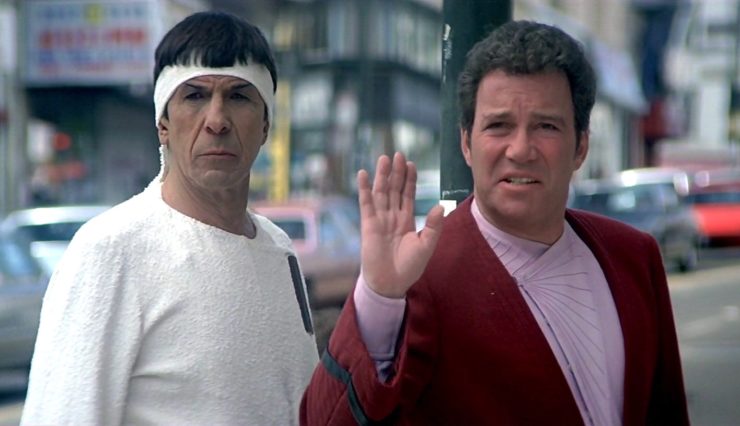
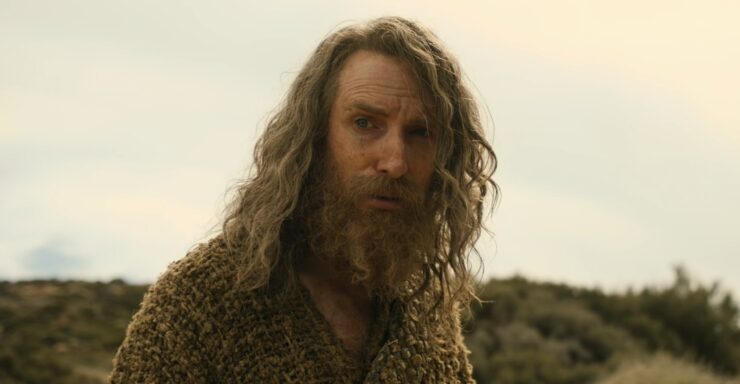
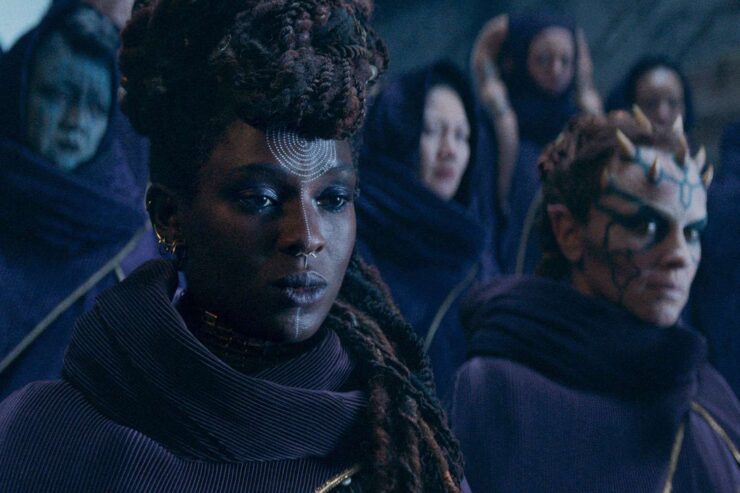
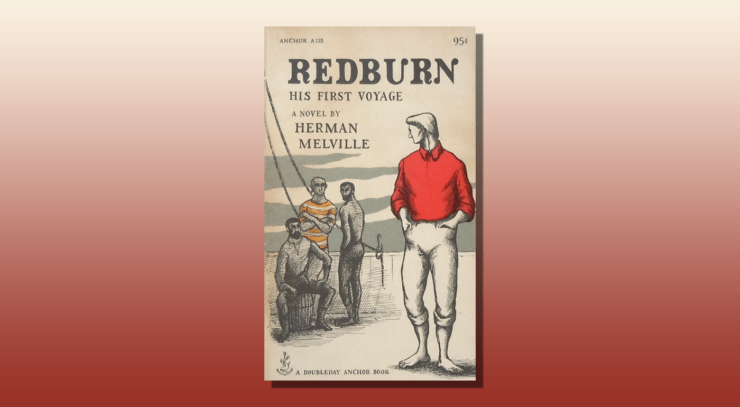
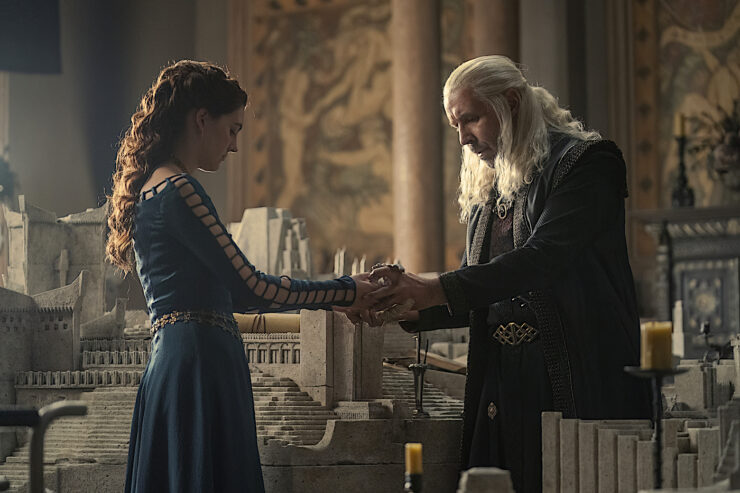
I have to say, I always suspected that Spock said “The Giants” sarcastically, although I know Vulcans don’t really do that, especially given that he was still recovering from his rebirth. But that line always made me laugh specifically because of that, Spock’s dry sense of humor regarding humanity’s quirks peeking through even these dire circumstances.
Hmm… I always assumed Spock was being facetious with that line.
As a kid, I had no idea who Susann and Robbins were or that they were even authors. To the best of my kid reasoning, I thought Kirk and Spock were talking about the San Francisco Giants. This Susann and Robbins must be… players who curse a lot. Right?
Swing and a miss!
The reference to Susann and Robbins may have been either a nod to or thumbed nose at Harlan Ellison, who more than once lambasted both authors as hacks whose works are mistaken for literature because they sell well. Interestingly, both were still pretty big when this film came out, but faded rather quickly not long after.
As for Spock’s reference to “the giants”, sarcasm is a possibility I always considered. It could also be befuddled Spock whose head still isn’t on straight making a knowing comment to cover up having no idea who Kirk is talking about.
wait a minute here. “The Ballad of Bilbo Baggins” was supposed to be serious?? :p
I think Spock was either being hugely sarcastic with that line (for all that Vulcans are said to express no emotions, they are unbelievably sarcastic and/or passive-aggressive quite a lot of the time) or he had no idea who they were and said that out of an attempt to be polite.
honestly…i had no idea who these writers were, but to emmett’s point, it could very well be that in 4 centuries, and after a nuclear war, that popular writers could be more remembered and more highly thought of than “serious” writers of our time. for 3 reasons.
1. they could be said to more accurately reflect how people in our time thought of things, and provide insight into our daily lives, so that scholars in the future would look to them for those insights
2. the books our parents/grandparents read become more highly regarded over time. another example of this would be the works of agatha christie. considered pulp trash in their day, more highly regarded now.
3. given the 4 centuries and nuclear war assumptions, they are simply more likely to be available to people for study/enjoyment, due to existing as paper copies in larger numbers than more serious works (and nukes wiping out electronic copies due to emp, etc)
One of the small touches I loved in one of the early In Death books by Nora Roberts/JD Robb (I have no idea which one) is when Eve Dallas makes a passing reference to having read the classics in school: King, Grisham, and the like.
I always took Spock’s remark at face value: it’s a joke for us the audience, who know how those authors were regarded, but in-universe it makes sense that the giants of pop culture have once again become the giants of literature.
After many years and many more viewings, I had never made the connection between both Kirk and Edith Keeler crossing the street. Perhaps the good captain was so traumatised, he pushed that event far, far back into his subconscious.
Even if Spock was being sardonic, it does mean he was familiar enough with those author’s works to make such a comment.
The novelization explicitly mentions that Kirk thought of Keeler right after that near-miss.
I’d argue there’s no specific in universe reason that classical Western authors are commonly referenced in Trek – the franchise was simply penned by artists who were immersed in that literary world, and it was easier for them to reference and crib relevant lines than it would have been to invent intervening future artists and authors who spun superficially repackaged versions of those works. It’s only intentional world building in the sense that they wanted to enrich the franchise through connections to celebrated and often philosophically remarkable works.
@1 @2
Lots of Spock using very dry wit in this one. He is having McCoy on again and again – even Scotty gets into the act with “hello computer” making McCoy think he has to suggest how to use it… to Scotty…
“One damn minute, Admiral” absolute gold.
The fact that Kirk refers to “the complete works of Jaqueline Susann” and “the novels of Harold Robbins” (suggesting a plural of many, not just a few), definitely suggests their works are well known in the 23rd century. I also didn’t take Spock as being sarcastic as much as the writers were being sarcastic.
also, I believe Shatner is Jewish as well.
I find Next Generation to be Eurocentric and pretentious, outside of Dixon Hill.
Shout out to Kirk Thatcher, Leonard Nimoy’s production assistant, who played the celebrated “punk on the bus” (and even wrote and sang the song that was playing on the boom box). Still one of my favorite scenes from any Trek movie.
I always thought the original series and Next Generation characters were snobbish towards 20th century culture to say the least, although Kirk in the kelvin reality liked the Beastie Boys. One exception was Tom Paris, who loved 20th century culture especially movies and TV shows, perhaps created as a response to the others.
The practical reason these Western Canon works are referenced in TNG is because they are in the public domain and there are culturally familiar to the core audience who were Americans. We do know that video games do exist the TNG universe. No one really gives Riker a side eye for suggesting they play a game until they start acting like pod people. Trashy holonovels are a known thing in DS9 and Vorager. Presumably some of these still exist in book and video formats as well, they just are not talked about much on the shows.
The biggest indicator that Robbins and Susann are considered great literature in Star Trek’s 23rd Century are that Kirk and Spock even know of them at all.. Most people would not know of Shakespeare’s less well regarded contemporaries except for scholars on the subject of Elizabethan era English playwrights. Heck, Shakespeare himself was l”ost” for a couple hundred years.
The idea that Spock is being facetious, while obviously true for our time, does not make sense for him as a character because it would mean that he had familiarity with these books from long ago that were trash and he knows that they were trash. Generally people learn great books from the past, not the trash. So if Spock has learned the trash so that he can recognize they are trash and say The Giants facetiously, it really raises more questions than it answers.
It’s not impossible that Susanne and Robbins should be the authors remembered three centuries in the future. As Emmett says Shakespeare was pop culture in his day, and extremely raunchy. 19th century literati would be stunned to learn that trash like Dickens and Sherlock Holmes are admired today. You just never know but by and large what is popular is also what lasts. To the vast distress of the high minded.
I suspect copywrite law has a lot to do with the absence of 20th c. Culture from… Well 20th century culture. But wouldn’t it be fun if some 23rd c. Character was a huge anime fan?
It was meant to be a joke. A sarcastic reference. Spock was known for his dry humor and sardonic commentary on humans and humanity. Either Spock was well read enough that he was familiar with the authors to know their reputations or he knew he was well read enough that if he hadn’t even heard of the authors in question then they must not be well known at all and for good reason! Ergo the sarcastic response…”Ah….The Giants”. Don’t forget “the look” Kirk gives him after the comment!
Perhaps in several hundred years, scholars will inaccurately believe that Susann and Robbins were unusually tall, due to inaccurate interpretations of archaeological data and mistranslations of colloquial terms?
Spock was being snarky.
The One with the Whales is by far my favorite Star Trek movie, if not my favorite Star Trek project, almost entirely for moments like this. And then there’s Kirk telling Gillian that they don’t use cash in the future, another great moment.
Don’t forget that Odo became quite the fan of Mike Hammer (“Shadows and Symbols”), and of Raymond Chandler (“Field of Fire”).
OK, but can we get multiple Canterbury Tales limited series on TV? Historical, modern, fantasy, noir, space opera…just…all of them! Mix them up with different cultures as well, don’t just give me many English redos!
I was born in 87, and named James T Kirk, I’m pretty sure, but not certain it was this movie that convinced my father to name me so. However, though I am a lifelong trekking, This is my least favorite Star Trek movie. I just really don’t like ANY of the episodes where they deal with the modern Era. I want to watch the future, I don’t want to be brought back to modern earth. So I really disagree, but not because I think you’re wrong, but just because it’s not my taste. I am, however, always glad to see more Star Trek.
This may be an unpopular position, but I find it a cute but not significant moment. Perhaps Spock was intended to be being sarcastic, but I find it more likely that they were having a little bit of fun–wouldn’t it be amusing if writers currently considered bad, if popular, were the ones whose work came to be considered great? And maybe they were making a point vaguely like what the article is making, that popular and quality, popular and enduring, are the same thing, that there is no such thing as popular trash.
And you know, I don’t think that’s true. You can often tell the difference right away between a movie that’s going to be talked about in ten years and one that’s not, even if they made the same box office, even if you’re pleased to contribute to that box office. I look at my bookshelves, and most of the books on them I enjoyed reading at the time, and some of them I can remember and might re-read, and others . . . what was that about again? The ones I think were masterpieces I can’t exactly buy ten times to signal my appreciation (Note, “masterpiece” doesn’t have to mean “serious”; “dying is easy–comedy is hard”. There is lousy fluff and there is amazingly good fluff that stands the test of time, like Jeeves and Wooster). And the difference between something getting big sales and not can be razor-thin and based on timing, marketing, chance of many sorts. We’ve all seen stuff that’s mediocre at best but with a huge media hype-machine behind it sell well, but usually not with a long tail. One interesting thing about Trek itself is that interest in it hung on for decades after the initial show ended without any money behind it.
Some of the comments here suggest to me that Robbins and Jacqueline Susann were choices that actually now show the limitations of the conceit: They were extremely popular, they did sell well, but by the time the movie aired they were already more remembered for being very popular than actually still popular, and now nobody younger than a certain age has heard of them. They will survive for a little while in English Literature departments that do genre studies, and then it is very likely they will be almost entirely forgotten, a footnote occasionally mentioned in studies of literary history. In short, they’re not giants, and they’re probably not gonna be, and so looking at the movie now the pop culture reference and the comedic point are kind of lost.
As for why Star Trek typically mentions people like Shakespeare and Dickens and not contemporary writers of the day, i think they do this to not date themselves. A movie written in the mid-80s that includes authors from that year would include someone like Jean M. Auel who was on the NY Times 1986 best seller list. I have no idea who this person was and I was 24 years of at the time. To be honest, there were other authors in 1986 that continue to be famous like Stephen King but its easier to mention authors or artist you know people will still know 59 years from now.
As for the “Spock calling Susann and Robbins “the Giants,” is another matter entirely.” well obviously that was a joke and let’s be honest, i doubt many people today watching the is movie would get the reference and the joke. This of course goes back to my original point, if you make a reference make sure everyone is going to know who you are talking about. Star Trek does this by using classical characters or authors.
As for the western influence, lets be honest, its an American movie made for Americans. Who do think they are going to reference, someone from India. It would go over most American heads. And finally, my guess is that Star Fleet was an American/Western endeavor, no different that the UN
The article does raise some interesting stuff about how to deal with culture in SF, especially in the medium to far future. If you have nothing but present-day cultural references, especially if the characters are in the far future, it starts to feel kind of weird and fake, as Mr. Asher-Perrin points out. If the characters are all into timeless literature and music that seem like they plausibly would be remembered in the future, it’s weird that none of them are into anything more popular. On the other hand, if tons of stuff that’s popular right now this moment is somehow the thing to be into way in the future, that seems utterly implausible.
You can invent a pop culture of the future, but that has its own problems. If you invent new cultural references from scratch, they don’t resonate with people. Plus it’s kind of hard. So I’ve noticed in many shows a strong tendency for characters to have a thing for 20th century culture, like in Babylon 5 Mr. Garibaldi’s addiction to Looney Tunes.
They sometimes have some fun with this in Red Dwarf, with Rimmer saying “Why don’t you listen to the classics, like the three M’s–Mozart, Mendelsson and Motorhead?” While Lister listens to invented future pop culture. Probably it’s best to do a mix like that, keep some current references but go easy and at least try to make clear that there is a future-day cultural scene.
Old School Doctor Who First Doctor Companion Ian Chesterton comments that 22nd century Vickie would have never heard of the Beetles. ‘I love classical music!’ she fires back. ‘ I’ve been to their memorial concert hall in Liverpool!’ It’s been pointed out that doesn’t sound as silly today as it did in 1964.
In the movie Time After Time a temporarily displaced HG Welles groping for a pseudonym gives the name of a character in a series of magazine short stories back in the 1880s. Unfortunately the name is Sherlock Holmes.
Lots of good comments here that point out that Western literature tended to be a favorite of TOS-era writers, for several reasons. But one not mentioned is that, even into the early 1980s, pop culture was extremely ephemeral. It may seem today that there was a lot of media preserved from the dawn of mass media: print, then film, then radio, then television. But it’s important to remember that very little of it was available to be reviewed after its original publication/broadcast. In the pre-digital age, media was expensive to preserve and it was expensive to store, therefore it was difficult to access. There was so much of it, and always the promise of more. So they just weren’t as obsessed over pop culture like we are today. So when the TOS writers went looking for cultural touchstones that would be familiar to their American audiences, given the times (60s), biases (largely white, largely male, largely educated), they arrived on the stuff they studied in school. Yes, they held it in high regard, and yes they probably looked down on current pop culture (of which they were actively a part of) as low brow. But in large part it was a practical decision: they counted on their intended audience being familiar with it.
As others mentioned, what may have been low brow then is held hgh today (even true for Shakespeare). As the franchise went on, we see the corresponding shift in attitudes, tempered by a greater cognizance of what we would now call canonicity within the franchise.
I sometimes imagine a future in which the only surviving trace of Elvis Presley is the Elvis Impersonator character in a bunch of unrelated movies. Scholars debate his significance.
I would like to add that Janeway in Voyager enjoyed role playing a Gothic Novel reeking of Jane Eyre. Though inventing future pop is fun–I invented a show called ‘Cascade Cop’ starring Lt. Darla Dagger for a throwaway reference for a novelette of mine.
However, I do wish the writers of “Our Man Bashir” had shown a scene where Julian picked up all his new weapons and other tech. You *know* which letter of the alphabet would have been there for it.
I think it Spock was absolutely serious and in looking back hundreds of years we tend to remember the popular culture of the day.
Quick, name the 18th century books and authors you remember. I’d venture to say that Defoe’s Robinson Crusoe and Swift’s Gulliver’s Travels lead the list.
Ultimately, non academics, like Spock and Kirk and most of us, don’t remember what the academics consider the best literature. Rather we view it from an anthropology perspective and look at the most representative literature of the past culture.
@3 I am with you. Till I read this article, I didn’t realize that Spock referred to “Giants” as sarcastic comment towards Kirk’s literally choices. I assumed he meant that as reference to a sports team something like “Jacqueline Susann, novels of Harold Robbins… AND Giants”
Star Trek IV The Voyage Home was always one of my favorite Star Trek movies in large part because of the humor. That particular scene was a hoot. I always took it as Captain Kirk not knowing exactly what he was talking about but still assuming great authority and Spock’s response, rather than being knowing sarcasm, is a naively serious comment and therefore quite funny. The writers were totally making fun of popular, mass-appeal novels of the time and this wasn’t meant at all to suggest that these novels have become serious literature in the future.
I never thought Spock was making a snarky comment, but that he was referring to another late 20th century book series, “The Giants” by James P. Hogan.
I don’t know why Spock would be snarky at this time in the movie. He’s completely serious and honest about everything, to a fault, and to much hilarity. He doesn’t understand profanity. He doesn’t like punk rock. And he can’t bring himself to calling his best friend Jim. Why would he suddenly be snarky about literature? Seems out of character.
Re: Invented pop culture. Martha Wells MurderBot series has both the semi-biological constructs (MurderBot itself) and pure machines (ART) absolutely engrossed in watching ‘many thousands of hours’ of downloaded popular media. They even share viewing time and rewatch some episodes repeatedly (Sanctuary Moon and Worldhoppers for the win!) to help each other understand these weird ‘humans’. It’s even a bargain chip in dealing with other ‘Bots. A deft way to introduce future pop culture into that ‘Verse.
Whether Spock was being sarcastic — I think he was — the reality is that “classic” is defined by history, not contemporary critics. Centuries hence, James Joyce may be nearly forgotten and English professors and teachers will be teaching the classics by Joyce Carol Oates and LA Banks. R
In Spock’s first scene in this movie, he is being re-educated under his human mother Amanda’s tutelage. She was fond of Lewis Carroll’s works, but beyond that, we have no knowledge of her taste in literature.
Perhaps Susann and Robbins are the basis for some highly successful holonovel adaptations?
The Second Doctor serial “The Mind Robbers” has the Doctor attacked by Karkas, a 21st century comic strip character. It’s a nice little detail.